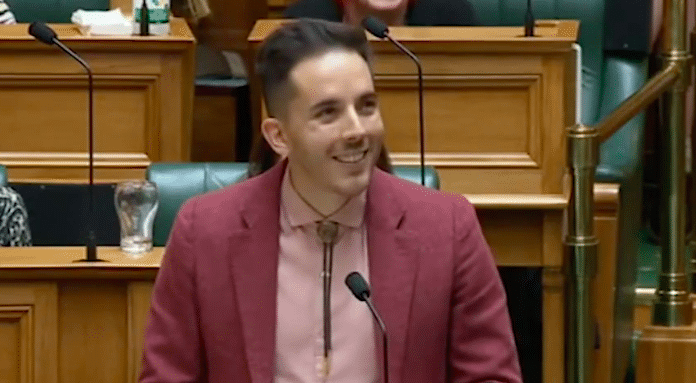Proud queer migrant MP tells parliament ‘be gay, do crime’ in unapologetic maiden speech

Ricardo Menéndez March is a gay, newly-elected New Zealand Green party MP. (Facebook/ Ricardo Menéndez March MP)
Newly-elected New Zealand MP Ricardo Menéndez March gave his first speech in parliament Wednesday (9 December), titled: “Be gay, do crime”.
This year, Ricardo Menéndez March became part of New Zealand’s queerest parliament in history, with 10 per cent of MPs openly identifying as LGBT+ following the October election.
A queer, Mexican migrant and former anti-poverty activist. March gave his maiden speech in parliament on Wednesday (9 December), as MP for the Green Party of Aotearoa New Zealand in the House of Representatives.
He began by acknowledging all those forced to lie to the government’s Work and Income department in order to survive.
“In our queer community there is a saying that I love,” he added. “It goes, ‘Be gay, do crime.’
“To me it means to be transgressive, to acknowledge that decision makers have created rules that criminalise our survival and our existence.”
Menéndez March said that “for many migrant communities, finding legitimate ways to stay connected to their new homes is a crime that results in an overstayer status”.
“For sole caregivers, it means lying to Work and Income about their relationship status in order to have enough income to feed their children,” he continued.
“The rules were simply not made for us. They were made to uphold a system where the wealthy few keep getting richer at the expense of our planet, and this house is enabling it.
“When your ability to be who you are — and therefore your survival — is criminalised, it is an act of love to break the rules to allow others to thrive.”
Ricardo Menéndez March is ready to have the uncomfortable conversations.
Ricardo Menéndez March was targeted with a huge amount of racist and homophobic abuse when he was sworn in this year, as he showed visible discomfort swearing an oath to Queen Elizabeth II, and made a joke about it online.
But he told Stuff: “It does show the reality that being unapologetically migrant and unapologetically queer.
“Whenever we express these views while being unapologetically who we are, we will get that backlash. People like [former prime minister of New Zealand] John Key can have a conversation about being a republic and it is treated as being a fair political conversation that we can have.”
For him, he said, “it was raising a level of discomfort over the colonial nature of parliament. I know I am not the first MP to do this”.

